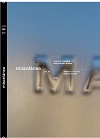Traversing the Fantasy in the Twenty-First Century Bildungsroman: The Ontological Quest and Lacanian Psychoanalysis in David Mitchell's number9dream
DOI:
https://doi.org/10.26754/ojs_misc/mj.20148782Palabras clave:
David Mitchell, Bildungsroman del siglo XXI, Psicoanálisis de Lacan, Fantasía, Búsqueda ontológicaResumen
number9dream (2001), de David Mitchell, ha sido considerada una "novela de iniciación posmoderna" que redefine la narrativa de la mayoría de edad a través de un marco posmoderno. Por muy útil que resulte esta definición para distinguir la novela de Mitchell del relato tradicional de madurez, la mayoría de las lecturas basadas en la noción de su ficción como "posmoderna" han tendido a malinterpretar o subestimar aspectos importantes de su arte. En este artículo argumento esta idea utilizando las teorías de Jacques Lacan, Slavoj Žižek y Brian McHale. Inspirándome en la concepción de McHale de la estética posmodernista, hasta ahora no aplicada a number9dream, analizo la novela desde el punto de vista de su dominante "ontológico" (por oposición al "epistemológico"), definida aquí como el modo en que number9dream da prioridad a las cuestiones sobre el "ser" del mundo de su protagonista frente a las de cómo puede "conocerse" este mundo. En este contexto es crucial la fantasía, que Mitchell no entiende como un modo de evasión sino, al igual que Lacan y Žižek, como el "soporte" de la realidad. En lugar de estar subordinada al "principio de realidad", la fantasía actúa en number9dream como un agente impulsor y transformador en el progreso del protagonista hacia la madurez: un proceso que conlleva la comprensión de que el mundo que habita, en lugar de estar siempre presente, emerge siempre a través de sus propias actividades "fantasmáticas".
Descargas
Citas
ADISESHIAH, Siân, and Rupert hildyard. (eds.) 2013. Twenty-First Century Fiction: What Happens Now. Houndmills, Basingstoke: Palgrave Macmillan.
BAYER, Gerd. 2014. “The Ethics of Breaking up the Family Romance”. In Onega, S. and Ganteau, J-M. (eds.) Contemporary Trauma Narratives: Liminality and the Ethics of Form. New York: Routledge: 120-136.
BOULTER, Jonathan. 2011. Melancholy and the Archive: Trauma, History and Memory in the Contemporary Novel. New York: Continuum.
BOXALL, Peter. 2013. Twenty-First-Century Fiction: A Critical Introduction. Cambridge: Cambridge U.P.
BRADFORD, Richard. 2007. The Novel Now: Contemporary British Fiction. Oxford: Blackwell.
CHILDS, Peter, and James Green. 2011. “The Novels in Nine Parts”. In Dillon, S. (ed.): 25-47.
DILLON, Sarah. (ed.) 2011. David Mitchell: Critical Essays. Canterbury: Gylphi.
HIGGINGS, Dick. 1978. A Dialectic of Centuries: Notes Towards a Theory of the New Arts. New York and Barton, Vermont: Printed Editions.
HUTCHEON, Linda. 1987. “Beginning to Theorize Postmodernism”. Textual Practice (1): 10-31.
—. 2002. The Politics of Postmodernism. London: Routledge.
IYER, Pico. 2007. “The Time 100: David Mitchell”. Time (May 3). <http://content.time.com/time/specials/2007/article/0,28804,1595326_1595332_1616691,00.html>. Accessed February 21, 2014.
LACAN, Jacques. 1997. Seminar VII: The Ethics of Psychoanalysis, 1959-1960. Trans. by D. Porter. Ed. by J.-A. Miller. New York: W.W. Norton & Company.
—. 1998. Seminar XI: The Four Fundamental Concepts of Psychoanalysis. Trans. by A.Sheridan. Ed. by J.A. Miller. New York: W.W. Norton & Company.
MCFARLANE, Robert. 2001. “When Blade Runnermeets Jack Kerouac”. Observer (March 11).<http://www.theguardian.com/books/2001/mar/11/fiction.davidmitchell>. Accessed February 23, 2014.
MCHALE, Brian. 1987. Postmodernist Fiction. London: Methuen.
MITCHELL, David. 2001. number9dream. London: Sceptre.
—. 2003. Number9dream. New York: Random House.
MORETTI, Franco. 1987. The Way of the World. London: Verso.
ROE, Andrew. 2002. “Daydreaming in Tokyo”. San Francisco Chronicle (September 28).<http://www.sfgate.com/books/article/Daydreaming-in-Tokyo-David-Mitchell-s-2871757.php>. Accessed September 5, 2013.
ROTHBERG, Michael. 2000. Traumatic Realism: The Demands of Holocaust Representation. Minneapolis: University of Minnesota Press.
SIMPSON, Kathryn. 2011. “‘Or something like that:’ Coming of Age in number9dream”. In Dillon, S. (ed.): 49-76.
ŽIŽEK, Slavoj. 2010. “Avatar: Return of the Natives”. New Statesman (March 4). <http://www.newstatesman.com/film/2010/03/avatarreality-love-couple-sex/>. Accessed February 25, 2014.
—. 1999. “Is it Possible to Traverse the Fantasy in Cyberspace?” In Wright, E. and E. Wright. (eds.) The Žižek Reader. Oxford: Blackwell: 102-124.
—. 2003. Tarrying With the Negative. Durham, North Carolina: Duke U.P.
—. “The Cyberspace Real: Cyberspace Between Perversion and Trauma”. <http://www.egs.edu/faculty/slavoj-zizek/articles/thecyberspace-real/>. Accessed February 12, 2014.
—. 2001. The Fright of Real Tears: Krzysztof Kie´slowski Between Theory and Post-Theory. London: BFI Publishing.
—. 2000. The Ticklish Subject: The Absent Centre of Political Ontology. London: Verso.
Descargas
Publicado
Cómo citar
Número
Sección
Licencia
Derechos de autor 2023 Adina Sorian

Esta obra está bajo una licencia internacional Creative Commons Atribución-NoComercial 4.0.


